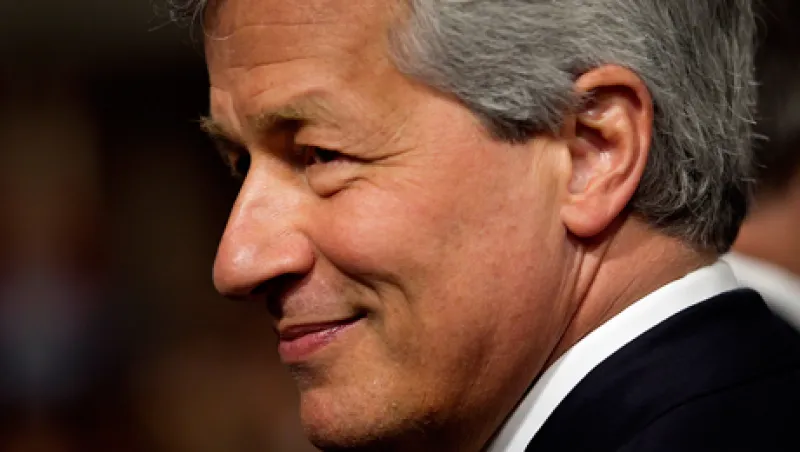“The Kresge Foundation knew they had taken the position before it was published in the [Wall Street] Journal, and we’re in Troy, Michigan,” according to Kresge CIO Robert Manilla, on May 15, referring to the J.P. Morgan announcement a few days earlier of a $2 billion loss in its London-based hedging unit known as the chief investment office.
Losses from the Whale Trade, as it is now known, are estimated at close to $9 billion.
So with all that extra time to watch the trade unfold, what do institutional investors think of that loss and its consequences, both regulatory and reputational?
Manilla was, on that morning, sitting with seven other top pension, endowment and foundation investors in New York City for a roundtable discussion after Institutional Investor’s Money Masters awards dinner. Joining Manilla were Donald Lindsey, CIO at George Washington University; Lawrence Schloss, CIO of the New York City Employee Retirement System; Douglas Brown, CIO of Exelon Corp.; Conrad Freund, COO of the LA84 Foundation; Sean Gissal, CIO at Marquette University; Joshua Gotbaum, director of the Pension Benefit Guaranty Corp.; and Lee Partridge, CIO at Salient Partners and CIO of the San Diego County Employees Retirement Association.
Editor Michael Peltz and Senior Writer Frances Denmark facilitated the two-hour discussion, excerpts of which appear below. The full roundtable will appear in the July-August issue of Institutional Investor and, along with some other timely excerpts, on the website.
Larry Schloss: It is terrible timing.
Robert Manilla: Yes, that’s a huge issue. If you’re going to hedge, you have to spend money to do it, and quite often you’re going to waste that money. We occasionally take views on the market, when we think things are overbought or oversold, and we’ll hedge it. We set a hedging budget each year. We’re willing to spend up to almost a percent of the fund on hedging if we think there are markets that need to be hedged, so that’s spending premium, usually. Hedging is expensive. Ideally, we’d rather just take the cash back and de-risk the asset allocation, but that’s not always an option.
Joshua Gotbaum: There’s another thing that’s going on, which is learning. As financial markets, financial instruments and the global markets change, all institutions are simultaneously in the process of taking risks and learning about the risks they’re taking, and then putting in place governance and oversight structures to manage those risks once they understand them. That’s a never-ending process. The fact that there was a mistake at J.P. Morgan, and it wasn’t caught, doesn’t mean that people shouldn’t try to recognize the risks. It is that they should pay attention and correct afterwards.
Manilla: The issue was the size of the position relative to the market. Kresge Foundation knew they had taken the position before it was published in the [Wall Street] Journal and we’re in Troy, Michigan. Every hedge fund in New York City knew he had the position in the CDS tranche, so certainly there are execution issues. But if they had lost $2 billion because they weren’t hedged on their book, would you have seen any different fallout? I think what they really lost is political capital.
Lee Partridge: The size of the market versus the size of their book — it’s a $2 trillion entity. New York City is not a $2 trillion entity. I mean, there are things that you can do and you can’t do at different levels. We took a bet, it went wrong, we’re moving on; it’s de minimis in the grand scheme of things. It was more that we didn’t understand.
Gotbaum: In the context of a debate over whether institutions can govern themselves, they need an extra pairs of eyes. Not because they will prevent every mistake from being caught, but they may increase the rate at which you learn. This mistake came at a time when the financial services industry was saying, ignore the last three years, we’re okay. If we’ve learned anything it is that financial markets are sufficiently interrelated that we need multiple sets of eyes.
Partridge: I completely agree with that, and the question is, in this whole pendulum swing from laissez-faire economics to overregulation, you just had the king of the financial industry say we need a second set of eyes. I always wonder about the unintended consequences. What is our phone book of regulations going to look like moving from here?
Conrad Freund: It was so poorly handled subsequent to that, Jamie Dimon saying we were stupid. I don’t think you want to be saying those things. You want to have a more rational response.
Donald Lindsey: You can’t regulate uncertainty, too. The longer you’re in this business and the more you learn, the more you realize what you don’t know, and that’s always going to be the case. The uncertainty factor has to be accepted. No amount of regulation is going to prevent that.
Freund: That wasn’t the message that came out afterwards. Instead of taking a reasonable approach by saying it’s $2 billion, but out of a bucket of assets that’s this big, we’re moving on, there were comments that lead to more making the phone book thick. That was really unproductive.
Douglas Brown: I think the risk is this one event has unduly influenced the discussion with the regulators and the legislature. And in the sound-bite media frenzy surrounding this event, the risk is that the regulators and the legislature won’t truly take the time to figure out exactly what happened and how that should influence the legislation. I think that’s the biggest risk.
Manilla: I do think there’s one thing that’s clear. Defining the risks in the system is getting much more difficult to do. Because what we’ve seen is most of the bad hedging or the blowups at hedge funds — or even in this case — is because it’s really hard to define your risk and then find a hedge that cleanly offsets it. So in trading lingo, it’s really a dirty hedge. And you’ve seen that happen now numerous times where people thought they were hedged, and their hedge didn’t behave opposite their asset. I think this points to the fact that the system is much too complicated today to truly understand all of the risks you’re taking.
Partridge: There is a rule of law. The taxpayer should be the most senior player in this whole capital structure. Somehow the taxpayer continues to be structurally subordinated, eating all these losses and bailing out either debt holders or equity holders.
Lindsey: The issue of transparency is huge. I think it’s going to be extremely important going forward. A lot of us, ten years ago — even five years ago — were willing to invest in strategies with limited amounts of transparency. The hedge fund community has been pretty much responsible for a lot of the lack of transparency in other investment strategies. That’s changing. I remember a time when fund managers would say, even if we gave you that position, what could you do with it? And maybe ten years ago that was true, but technology has changed to the point where having the visibility, knowing what’s in your portfolio at all times, is doable; and the technology can provide a lot of feedback. It’s not going to prevent mistakes, but it’s going to raise red flags that you can question. So I think as institutional investors, transparency should be demanded more, it should be emphasized more.
Schloss: It’s a very complicated thing going on with J.P. Morgan in the city and shareholder activism. I’ll tell you my speculation on J.P. Morgan. They knew exactly what they were doing. It is a $2.5 trillion balance sheet, but this is the hedging department. Their job is to hedge, and they screwed up a hedge. That’s all it is. It’s not more complex, nothing nefarious. You could disclose it all you like. They made the classic Wall Street mistake of overly believing their people knew what they were doing because they made them a lot of money in the past.
But it’s exactly what everybody would want. You’d want some group to assimilate all the risks in the firm in one über risk sensor, so it’s not in little pockets, right? It’s disclosed as transparent. This is our risk management department, and we’re putting on the overlay. That’s what they did, and they got it wrong. You can’t regulate to be right. They made a mistake.






